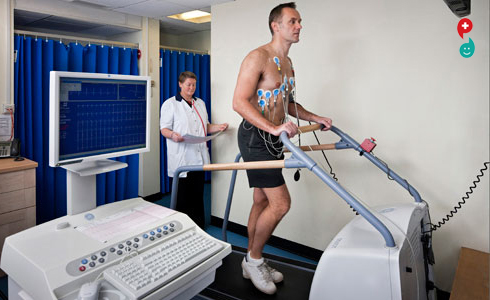Overview
A stress test, also called an exercise stress test, shows how your heart works during physical activity. Because exercise makes your heart pump harder and faster, an exercise stress test can reveal problems with blood flow within your heart.
A stress test usually involves walking on a treadmill or riding a stationary bike your heart rhythm, blood pressure and breathing are monitored. Or you'll receive a drug that mimics the effects of exercise.
Your doctor may recommend a stress test if you have signs or symptoms of coronary artery disease or an irregular heart rhythm (arrhythmia). The test may also guide treatment decisions, measure the effectiveness of treatment or determine the severity if you've already been diagnosed with a heart condition.
Why it's done
Your doctor may recommend a stress test to:
Diagnose coronary artery disease. Your coronary arteries are the major blood vessels that supply your heart with blood, oxygen and nutrients. Coronary artery disease develops when these arteries become damaged or diseased usually due to a buildup of deposits containing cholesterol and other substances (plaques).
Diagnose heart rhythm problems (arrhythmias). Heart arrhythmias occur when the electrical impulses that coordinate your heart rhythm don't function properly, causing your heart to beat too fast, too slowly or irregularly.
Guide treatment of heart disorders. If you've already been diagnosed with a heart condition, an exercise stress test can help your doctor find out how well treatment is working. It may also be used to help establish the treatment plan for you by showing how much exercise your heart can handle.
Your doctor may use a stress test to help determine the timing of cardiac surgery, such as valve replacement. In some people with heart failure, stress test results may help the doctor determine whether you need a heart transplant or other advanced therapies.
Your doctor may recommend a test with imaging, such as a nuclear stress test or echocardiographic stress test, if an exercise stress test doesn't pinpoint the cause of your symptoms.
Risks
A stress test is generally safe, and complications are rare. But, as with any medical procedure, there is a risk of complications, including:
Low blood pressure. Blood pressure may drop during or immediately after exercise, possibly causing you to feel dizzy or faint. The problem should go away after you stop exercising.
Abnormal heart rhythms (arrhythmias). Arrhythmias brought on by an exercise stress test usually go away soon after you stop exercising.
Heart attack (myocardial infarction). Although exceedingly rare, it's possible that an exercise stress test could cause a heart attack.
How you prepare
Your doctor will give you specific instructions on how to prepare for your stress test.
Food and medications
You may be asked not to eat, drink or smoke for a period of time before a stress test. You may need to avoid caffeine the day before and the day of the test.
Ask your doctor if it's safe for you to continue taking all of your prescription and over-the-counter medications before the test, because they might interfere with certain stress tests.
If you use an inhaler for asthma or other breathing problems, bring it to the test. Make sure your doctor and the health care team member monitoring your stress test know that you use an inhaler.
Clothing and personal items
Wear or bring comfortable clothes and walking shoes. If you're having a nuclear stress test, don't apply oil, lotion or cream to your skin that day.
What you can expect
Your stress test will take around an hour, including both your prep time and the time it takes to perform the actual test. The actual test takes only around 15 minutes. You may have an exercise stress test in which you walk on a treadmill or pedal a stationary bicycle. If you aren't able to exercise, you'll receive a drug through an IV that mimics exercise by increasing blood flow to your heart.
Before a stress test
First, your doctor will ask you some questions about your medical history and how often and strenuously you exercise. This helps determine the amount of exercise that's appropriate for you during the test. Your doctor will also listen to your heart and lungs for any abnormalities that might affect your test results.
During a stress test
A nurse or technician will place sticky patches (electrodes) on your chest, legs and arms. Some areas may need to be shaved to help them stick. The electrodes have wires connected to an electrocardiogram machine, which records the electrical signals that trigger your heartbeats. A cuff on your arm checks your blood pressure during the test. You may be asked to breathe into a tube during the test to show how well you're able to breathe during exercise.
If you're not exercising, your doctor will inject the drug into your IV that increases blood flow to your heart. You might feel flushed or short of breath, just as you would if you were exercising. You might get a headache.
You'll probably exercise on a treadmill or stationary bike, starting slowly. As the test progresses, the exercise gets more difficult. You can use the railing on the treadmill for balance. Don't hang on tightly, as this may skew the results.
You continue exercising until your heart rate has reached a set target or until you develop symptoms that don't allow you to continue. These signs and symptoms may include:
Moderate to severe chest pain
Severe shortness of breath
Abnormally high or low blood pressure
An abnormal heart rhythm
Dizziness
Fatigue
Certain changes in your electrocardiogram
You and your doctor will discuss your safe limits for exercise. You may stop the test anytime you're too uncomfortable to continue exercising.
After a stress test
After you stop exercising, you may be asked to stand still for several seconds and then lie down for a period of time with the monitors in place. Your doctor can watch for any abnormalities as your heart rate and breathing return to normal.
When your exercise stress test is complete, you may return to your normal activities unless your doctor tells you otherwise.
Results
If the information gathered during your exercise stress test shows your heart function to be normal, you may not need any further tests.
However, if the results are normal and your symptoms continue to worsen, your doctor might recommend a nuclear stress test or another stress test that includes an echocardiogram before and after exercise or medications to increase blood flow to your heart. These tests are more accurate and provide more information about your heart function, but they are also more expensive.
If your stress test results suggest that you might have coronary artery disease or show an arrhythmia, your doctor will use the information to develop a treatment plan. You may need additional tests, such as a coronary angiogram.
If you had a stress test to help determine treatment for a heart condition, your doctor will use the results to plan or change your treatment.
Stress is a very common factor for all working people. Work, home and taking care of the child all together causes great amount of stress in people. Exercising makes the body release endorphins, which are stress fighting hormones and help in relieving stress. There are various types of exercises which a working woman can do.
High energy activities: High energy aerobic exercises lead to an increased heart rate, which results in production of more endorphins that make the body fight stress naturally. They include running, skipping, dancing, etc. These also improve physical and mental health.
Yoga: Yoga is excellent for stress relief. It involves movement and stationary poses or postures, along with breathing exercises. Yoga enhances the body's natural response to relaxation, making your life healthier.
Tai Chi: Tai chi involves a series of flowing movements of the body along with breathing. Having its roots in martial arts, Tai Chi provides efficient stress relief.
Pilates: This exercise involves a series of movements and exercises performed on a mat. Pilates enhance strength, flexibility, endurance and immunity of the body.
Martial arts: Martial arts is an effective way of unleashing energy and venting out frustration, which result in reducing stress. There are different forms of martial arts to choose from, which include Judo, karate, Taekwondo and several others.
Kick boxing: Kick boxing reduces stress to a great extent and involves punching and kicking, which is performed with discipline. Kickboxing incorporates a rigorous workout schedule and is a great way to vent out frustration and energy, releasing stress.
Team sports: Team sports are an ideal way to relieve stress, work out and have fun, altogether. Playing tennis, cricket or football offers a double amount of stress relief. Playing with your family will encourage bonding, fun and help in relieving stress together.
On the go exercises: Several exercises such as running or jogging and cycling allow you to have a break, breathe some fresh country air and get your mind freshened up. Along with the release of energy, travelling across beautiful places helps in stress relief.
Meditation: Meditation is an amazing mind exercise for stress relief. It requires great concentration and must be performed in a quiet atmosphere. Peace of mind is obtained.
Gym activities: A gym has a lot of exercising instruments and devices. They involve power and strength and energy is unleashed. This is an ideal vent for anger and frustration, which results in great stress relief.
People face a lot of stress, which arise from various aspects of life, including work, home and children. Stress busting exercises should be practised to maintain a perfect mental health.

Taking too much stress may affect the brain development of your kids, a new study has claimed.
According to the researchers, the stress changes the father’s sperm which can then alter the brain development of the child.
This new research provides a much better understanding of the key role that fathers play in the brain development of their kids, the researchers said.
Previously, the researchers including Tracy Bale at the University of Maryland School, found that adult male mice, experiencing chronic periods of mild stress, have offspring with a reduced response to stress; changes in stress reactivity have been linked to some neuropsychiatric disorders, including depression and PTSD.
They isolated the mechanism of the reduced response; they found that the father’s sperm showed changes in a genetic material known as microRNA. MicroRNA are important because they play a key role in which genes become functional proteins.
Now, the researchers have unravelled new details about these microRNA changes. In the male reproductive tract, the caput epididymis, the structure where sperm matures, releases tiny vesicles packed with microRNA that can fuse with sperm to change its cargo delivered to the egg, they said.
The caput epididymis responded to the father’s stress by altering the content of these vesicles, the researchers added. The result of the study, presented at AAAS 2018 annual meeting in Austin, suggests that even mild environmental challenges can have a significant impact on the development and potentially the health of future offspring.
The researchers also noted that by learning more about links between a father’s exposure to stress and the risks of disease for his kid, we can better understand, detect, and prevent these disorders.
When people say, “I’m stressed out,” they’re usually describing a mental feeling of pressure or agitation. But while stress may begin in the brain, the process very much involves the body.
Our bodies aren’t meant to be in a constant state of fight-or-flight. Over the long term, living with chronic stress can actually harm the body in several ways:
1. Panic Attacks
The symptoms of a panic attack mimic a heart attack in many ways. Some indicators of a panic attack include:
• Rapid, shallow breathing (hyperventilation)
• Pounding, racing heart
• Sweating
• Tingling of the arms, hands, legs, feet, or numbness around the mouth
• Weakness, dizziness
2. Shoulder or Neck Pain
Any time your brain senses something wrong, like an imminent threat, it begins to activate the flight-or-fight response, which results in added muscle tension and bodily discomfort. Generally, this automated mechanism selectively tenses some muscles more than others. Chronic stress therefore causes contraction of and pain in the muscles of the neck and shoulders.
3. Insomnia
Chronic stress can also disrupt your ability to fall asleep, stay asleep, or experience restful sleep. Contrary to popular belief, insomnia doesn’t mean 100 percent sleeplessness night after night; it actually refers to any ongoing disruption to normal sleep patterns. And while the occasional sleepless night may be annoying, chronic sleep deprivation can lead to other health problems, such as obesity, decreased immunity, and high blood pressure.
4. Decreased Coping Skills
Coping skills are key tools for surviving what life throws at you. Chronic stress literally makes it harder for you make good coping decisions by turning off the higher-functioning centers of your brain. That’s why some people turn to alcohol, food, or illicit drugs to self-medicate their stress.
A tight stomach can feel different for everyone. It may feel as if the abdominal muscles are contracting and creating pressure in the stomach.
The feeling can come from the abdominal muscles, the stomach wall lining, or the organs surrounding the stomach.
The tight sensation is often a temporary discomfort caused by diet or hormones. However, it can also be a symptom of an underlying condition.
Potential causes of a tight stomach, including:
1. Constipation
2. Indigestion
3. Food poisoning
4. Irritable bowel syndrome (IBS)
5. Hiatal hernia
6. Gastritis
7. Premenstrual syndrome (PMS)
8. Pregnancy
The best methods for preventing a tight stomach will vary depending on the cause.
In some cases, it may not be possible to prevent a tight stomach, such as during pregnancy or food poisoning.
In other cases, the chances of developing the symptoms of a tight stomach can be reduced through:
1. Eating a healthful, balanced diet
2. Staying hydrated
3. Exercising regularly
4. Minimizing stress
In most cases, a tight stomach is not a cause for concern. However, if symptoms persist for longer than a few days, or are severe, then medical attention may be required.












